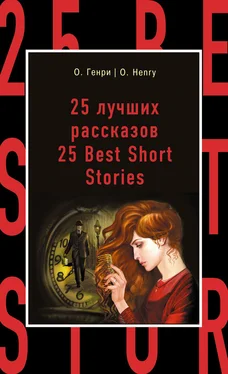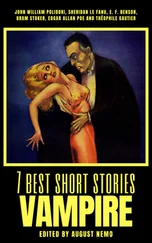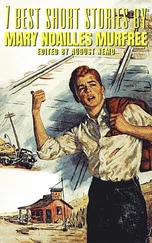The night before Thanksgiving came. Maida hurried home, keen and bright with the thoughts of the blessed morrow. Her thoughts were of purple, but they were white themselves – the joyous enthusiasm of the young for the pleasures that youth must have or wither. She knew purple would become her, and – for the thousandth time she tried to assure herself that it was purple Mr. Ramsay said he liked and not red. She was going home first to get the $4 wrapped in a piece of tissue paper in the bottom drawer of her dresser, and then she was going to pay Schlegel and take the dress home herself.
Grace lived in the same house. She occupied the hall room above Maida’s.
At home Maida found clamor and confusion. The landlady’s tongue clattering sourly in the halls like a churn dasher dabbing in buttermilk. And then Grace come down to her room crying with eyes as red as any dress.
“She says I’ve got to get out,” said Grace. “The old beast. Because I owe her $4. She’s put my trunk in the hall and locked the door. I can’t go anywhere else. I haven’t got a cent of money.”
“You had some yesterday,” said Maida.
“I paid it on my dress,” said Grace. “I thought she’d wait till next week for the rent.”
Sniffle, sniffle, sob, sniffle.
Out came – out it had to come – Maida’s $4.
“You blessed darling,” cried Grace, now a rainbow instead of sunset. “I’ll pay the mean old thing and then I’m going to try on my dress. I think it’s heavenly. Come up and look at it. I’ll pay the money back, a dollar a week – honest I will.”
Thanksgiving.
The dinner was to be at noon. At a quarter to twelve Grace switched into Maida’s room. Yes, she looked charming. Red was her color. Maida sat by the window in her old cheviot [213]skirt and blue waist darning a st – . Oh, doing fancy work.
“Why, goodness me! ain’t you dressed yet?” shrilled the red one. “How does it fit in the back? Don’t you think these velvet tabs look awful swell? Why ain’t you dressed, Maida?”
“My dress didn’t get finished in time,” said Maida. “I’m not going to the dinner.”
“That’s too bad. Why, I’m awfully sorry, Maida. Why don’t you put on anything and come along – it’s just the store folks, you know, and they won’t mind.”
“I was set on my purple,” said Maida. “If I can’t have it I won’t go at all. Don’t bother about me. Run along or you’ll be late. You look awful nice in red.”
At her window Maida sat through the long morning and past the time of the dinner at the store. In her mind she could hear the girls shrieking over a pull-bone, could hear old Bachman’s roar over his own deeply-concealed jokes, could see the diamonds of fat Mrs. Bachman, who came to the store only on Thanksgiving days, could see Mr. Ramsay moving about, alert, kindly, looking to the comfort of all.
At four in the afternoon, with an expressionless face and a lifeless air she slowly made her way to Schlegel’s shop and told him she could not pay the $4 due on the dress.
“Gott!” cried Schlegel, angrily. “For what do you look so glum? Take him away. He is ready. Pay me some time. Haf I not seen you pass mine shop every day in two years? If I make clothes is it that I do not know how to read beoples because? You will pay me some time when you can. Take him away. He is made goot; and if you look bretty in him all right. So. Pay me when you can.”
Maida breathed a millionth part of the thanks in her heart, and hurried away with her dress. As she left the shop a smart dash of rain struck upon her face. She smiled and did not feel it.
Ladies who shop in carriages, you do not understand. Girls whose wardrobes are charged to the old man’s account, you cannot begin to comprehend – you could not understand why Maida did not feel the cold dash of the Thanksgiving rain.
At five o’clock she went out upon the street wearing her purple dress. The rain had increased, and it beat down upon her in a steady, wind-blown pour. People were scurrying home and to cars with close-held umbrellas and tight buttoned raincoats. Many of them turned their heads to marvel at this beautiful, serene, happy-eyed girl in the purple dress walking through the storm as though she were strolling in a garden under summer skies.
I say you do not understand it, ladies of the full purse and varied wardrobe. You do not know what it is to live with a perpetual longing for pretty things – to starve eight months in order to bring a purple dress and a holiday together. What difference if it rained, hailed, blew, snowed, cycloned?
Maida had no umbrella nor overshoes. She had her purple dress and she walked abroad. Let the elements do their worst. A starved heart must have one crumb during a year. The rain ran down and dripped from her fingers.
Someone turned a corner and blocked her way. She looked up into Mr. Ramsay’s eyes, sparkling with admiration and interest.
“Why, Miss Maida,” said he, “you look simply magnificent in your new dress. I was greatly disappointed not to see you at our dinner. And of all the girls I ever knew, you show the greatest sense and intelligence. There is nothing more healthful and invigorating than braving the weather as you are doing. May I walk with you?”
And Maida blushed and sneezed.
When one loves one’s Art no service seems too hard.
That is our premise. This story shall draw a conclusion from it, and show at the same time that the premise is incorrect. That will be a new thing in logic, and a feat in story-telling somewhat older than the great wall of China.
Joe Larrabee came out of the post-oak flats of the Middle West pulsing with a genius for pictorial art. At six he drew a picture of the town pump with a prominent citizen passing it hastily. This effort was framed and hung in the drug store window by the side of the ear of corn with an uneven number of rows. At twenty he left for New York with a flowing necktie and a capital tied up somewhat closer.
Delia Caruthers did things in six octaves so promisingly in a pine-tree village in the South that her relatives chipped in enough in her chip hat for her to go “North” and “finish.” They could not see her f – , but that is our story.
Joe and Delia met in an atelier where a number of art and music students had gathered to discuss chiaroscuro, Wagner [214], music, Rembrandt’s works, pictures, Waldteufel [215], wall paper, Chopin and Oolong [216].
Joe and Delia became enamoured one of the other, or each of the other, as you please, and in a short time were married – for (see above), when one loves one’s Art no service seems too hard.
Mr. and Mrs. Larrabee began housekeeping in a flat. It was a lonesome flat – something like the A sharp way down at the left-hand end of the keyboard. And they were happy; for they had their Art, and they had each other. And my advice to the rich young man would be – sell all thou hast, and give it to the poor – janitor for the privilege of living in a flat with your Art and your Delia.
Flat-dwellers shall indorse my dictum that theirs is the only true happiness. If a home is happy it cannot fit too close – let the dresser collapse and become a billiard table; let the mantel turn to a rowing machine, the escritoire to a spare bedchamber, the washstand to an upright piano; let the four walls come together, if they will, so you and your Delia are between. But if home be the other kind, let it be wide and long – enter you at the Golden Gate [217], hang your hat on Hatteras [218], your cape on Cape Horn [219]and go out by the Labrador [220].
Joe was painting in the class of the great Magister – you know his fame. His fees are high; his lessons are light – his high-lights have brought him renown. Delia was studying under Rosenstock – you know his repute as a disturber of the piano keys.
Читать дальше
Конец ознакомительного отрывка
Купить книгу

![Коллектив авторов - Best Short Stories [С англо-русским словарем]](/books/26635/kollektiv-avtorov-best-short-stories-s-anglo-thumb.webp)










